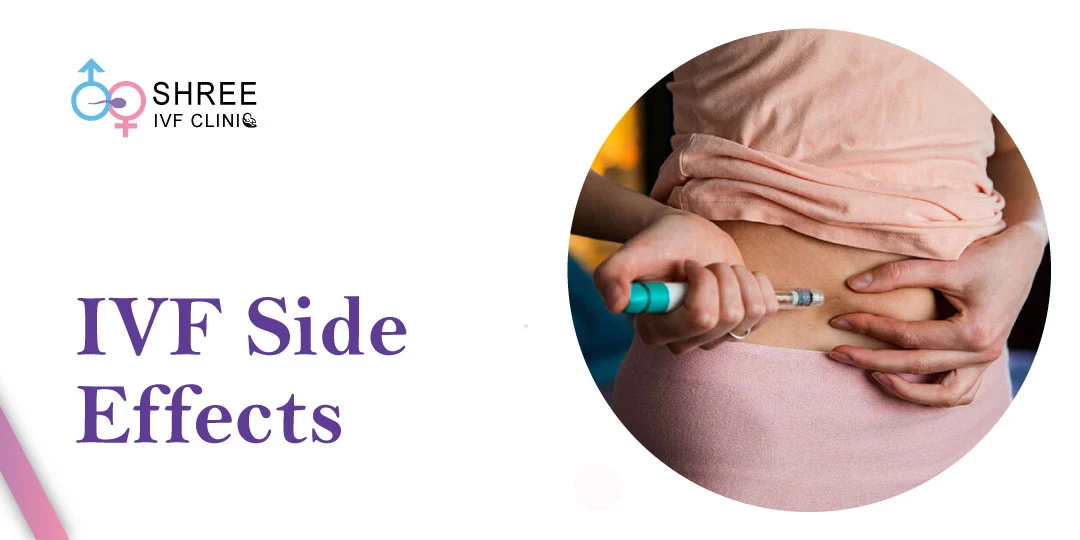Ovulation Induction for PCOS & Irregular Cycles Treatment in Mumbai

What is Ovulation Induction Treatment?
Ovulation induction is mainly a to-the-point treatment where hormonal pills are used to resume ovulation. Sometimes, having a severe hormonal imbalance can lead to irregular periods.
In the worst-case scenario, it can also lead to cysts in the ovary. Drugs are used for ovulation induction treatment, and women who cannot ovulate on their own take help from these. Moreover, ovulation induction helps in producing healthy eggs so that your ovary produces a healthy egg every month.
Everything You Need to Know About Ovulation Induction
Indications | Candidate | Medications | Process | What to expect | Risks & Symptoms | Side effects | Benefits | Preparation | Success rates | Cost
Indications for Ovulation Induction
If you are suffering from an ovulation issue, opting for ovulation induction is the best option. At times, disorders like PCOS, poor nutrition, or too much exercise can cause anovulation.
After you start taking the medications, you will soon start facing some symptoms. For example, bloating, nausea, hot flashes, tenderness in the pelvic region, blurred vision, etc. If you feel uncomfortable with the symptoms, then it is best if you immediately consult doctor.
Who is ovulation induction suitable/recommended for?
Ovulation induction therapy is easy and safe to opt for by many women. For example, women suffering from infrequent ovulation or the ones who do not ovulate at all can opt for this treatment procedure.
Doctors provide various fertility drugs based on the symptoms as well as the issues. Similarly, women having unexplained infertility issues can also opt for ovulation induction treatment.
Fertility drugs are essential for those suffering from infertility. The reason behind this is that it helps in increasing ovulation so that it becomes easy to conceive. Patients undergoing IVF treatments also take ovulation induction medicine to increase the egg production rate.
Medications Used for Ovulation Induction
Several medications are used for ovulation induction, most of which are hormonal drugs that boost egg production. Clomiphene citrate (Clomid or Serophene) is one of the most commonly prescribed oral options, typically taken for five days as directed by your doctor.
Doctors recommend fifty to a hundred mg per day; however, if the ovulation fails to occur, they increase the dosage. Clomiphene citrate is an FDA-approved medicine, and it tricks your body into thinking that you do not have enough estrogen. Although it is quite an effective medicine, success depends on various factors like age, other fertility issues, or semen parameters.
Next is letrozole, which is popularly known as Femara and is yet another oral medicine useful for ovulation induction. Few studies showed that women who take Clomid and have ovulation induction could take Letrozole.
Similarly, if you face any issues or side effects with Clomid, then you can switch to Letrozole. Initially, doctors recommend beginning the dosage with 2.5 mg. However, if the ovulation fails, your doctor will increase the dosage.
Gonadotrophins are also useful when it comes to treating ovulation induction. But it is different from that of Clomid or Letrozole. Gonadotropins are injectable drugs, and the dosage continues for about five to twelve.
Almost every patient is becoming comfortable with the concept of injecting Gonadotropins. The medication helps in allowing the follicles to mature; however, the dosage varies so that you can conceive. Besides, the threat of the risk of multiple births reduces as well. Doctors opt for the HCG injections that mimic the mid-cycle LH surge.
Book Your Consultation Today With an Ovulation Induction Specialist in Mumbai, India.
– Dr Jay Mehta
The ovulation Induction process
The process of ovulation induction is quite easy since the entire process of the treatment is quite straightforward. Doctors prescribe oral medications or hormonal injections to stimulate the ovulation process.
Once your menstrual cycle begins, you can take the medications. However, the doctor will keep monitoring your body through ultrasound. It is important to understand that the entire process of ovulation induction is quite safe.
Besides, doctors consider this treatment as one of the effective methods of treatment for removing fertility issues.
Step-by-Step Guide—Ovulation Induction
When opting for the ovulation induction procedure, it will include a few steps that are listed below.
- Stimulation—After taking the medicines, the drugs support the growth of the follicles carrying the eggs. Medicines normally replace the FSH so that the ovaries can produce high-quality eggs. Doctors keep tracking the follicular development as well as hormone levels through the stimulation cycle.
- Control—Soon after beginning the process, doctors recommend taking USG and blood tests so that they can track the medicinal effects. Apart from that, the tests also help in determining the hormonal levels along with the maturation status of the eggs. Doctors call the entire process follicular monitoring.
- Egg release—Once the follicles become ready and reach almost sixty to twenty millimeters, based on the medications, doctors push an HCG injection. Thus, you can get ready for intercourse or intrauterine insemination.
What to expect during Ovulation Induction?
Once the treatment for induction of ovulation starts, you might face some symptoms like hot flushes, nausea, pain in the pelvic region, etc.
However, once the medicines successfully work, you will be able to have regular periods. If you were planning for pregnancy but failed due to infertility issues, you can easily conceive post-treatment.
Alternatively, if you have been taking the IVF treatment, then the ovulation induction treatment will help in producing healthy eggs.
Risks, Symptoms associated with Ovulation Induction
Although the ovulation induction treatment is quite useful and effective, there are some associated risks as well.
Almost two million women between the ages of fifteen and forty-four opt for fertility drug treatments. Few iatrogenic complications are there that come with the use of ovulation induction agents.
Some of the common complications include preterm delivery and spontaneous abortion. Along with that, some severe complications include heterotopic pregnancy and the risk of ovarian cancer as well.
Side effects of ovulation induction
Just like the countless benefits that infertile women get out of ovulation induction treatment, there are some side effects too.
From abdominal distention to discomfort, bloating sensation, restlessness, and fatigue, you will come across many discomforts. Leaving them untreated can give rise to severe problems. For this reason, whenever you feel that the discomforts are increasing, you must immediately consult your doctor.
Benefits of ovulation induction
The only goal behind ovulation induction treatment is to make a woman fertile for conceiving. Even if you are not planning for pregnancy, opting for this treatment procedure will help in lowering the PCOS symptoms.
When planning for conceiving, once the treatment is complete, you can opt for normal intercourse. Apart from that, you can also opt for intrauterine insemination (IUI) or other fertility treatments.
Preparing for ovulation induction
The preparation procedure for the treatment is quite simple. Your doctor will ask you to take different tests. Based on the results, they will suggest you take hormonal medicines so that the effects of estrogen are reduced. Thus, your body will be able to produce follicle-stimulating hormones.
As a result, you will be able to conceive or have regular cycles. Doctors prescribe medicine like Clomiphene Citrate since it is one of the effective medicines for follicle stimulation.
Ovulation induction success rates
The success rate of ovulation induction depends on various factors like age, disease, diagnosis, etc. However, generally, almost twenty to twenty-five percent of women achieved successful results. Thus, women having PCOS or other infertility issues can get effective results from this treatment.
Ovulation induction Cost
The best part of the ovulation induction treatment is that it is quite affordable. Almost everyone can opt for it.
On average, IUI treatment in Mumbai costs between ₹25,000 and ₹35,000 per cycle, including tests, scans, and medications. The final cost may vary based on individual needs.
Testing for pregnancy
If you take the pregnancy test after undergoing the treatment, then you can also opt for the at-home tests. Pregnancy kits are available that are quite handy.
Alternatively, you go for a detailed check of the HCG hormone in your urine. Once you conceive, your body produces HCG. In case you get a positive result on the first day of your cycle, then it has been almost two weeks since your conception.
Chance of pregnancy with ovulation induction
As the ovulation induction treatment is quite effective, you can get pregnant after your treatment is completed. However, the result again varies, and if you fail to get pregnant, consult Dr. Jay Mehta, a leading fertility specialist in Mumbai, who offers personalized ovulation induction plans that are safe, effective, and tailored to your unique needs.

Dr. Jay Mehta
MBBS, DNB—Obstetrics & Gynecology
IVF & Endometriosis Specialist, Laparoscopic Surgeon (Obs & Gyn)
Dr. Jay Mehta is a highly renowned IVF specialist and fertility-preserving surgeon based in Mumbai, India. As the director of the Shree IVF and Endometriosis Clinic, Mumbai, he is recognized as one of India's leading laparoscopic gynecologists for the advanced treatment of complex conditions such as endometriosis and adenomyosis.
Dr. Mehta's expertise extends deeply into reproductive medicine; he is a well-known IVF specialist and among the few practitioners in the country with specialized knowledge in embryology, andrology, reproductive immunology, and Mullerian anomalies. Dr. Mehta conducts operations and consultations across India's major cities, including Pune, Chennai, Hyderabad, Bangalore, Ahmedabad, Agra, and Delhi. To book an appointment, call: 1800-268-4000
Blogs

Should I Do IVF After 3 Miscarriages?
Yes, IVF can be a strong option after repeated miscarriages. Combined with genetic testing, it helps increase the chance of a healthy pregnancy

What Are the Side Effects of IVF?
Know the side effects of IVF, from mild pain to hormonal changes, and get expert advice as you start your fertility journey.
Videos

क्या White Sticky Vaginal discharge ovulation Indicate करता है?
Many women trying to conceive often wonder whether white sticky discharge during mid-cycle indicates ovulation.

How to Calculate Ovulation During Irregular Cycle?
For women with a 28 to 30-day cycle, ovulation typically occurs between the 11th and 15th day. For irregular cycles, ovulation is determined through follicle studies



